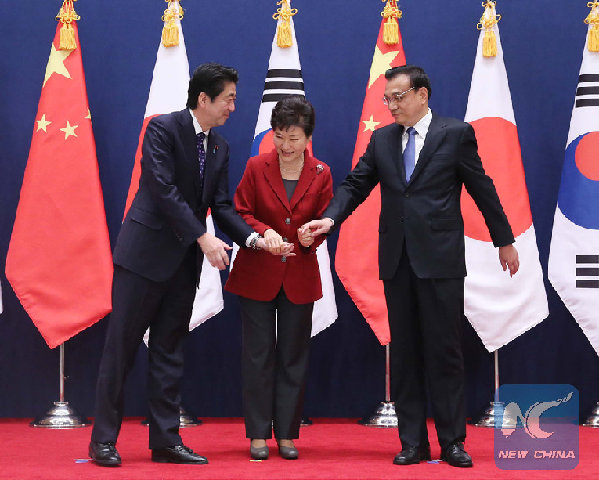China, ROK and Japan should be in solidarity
- By Zhao Kejin
 0 Comment(s)
0 Comment(s) Print
Print E-mail China.org.cn, November 5, 2015
E-mail China.org.cn, November 5, 2015
|
|
|
Chinese Premier Li Keqiang (R), Japanese Prime Minister Shinzo Abe (L) and South Korean President Park Geun-hye attend the sixth China-Japan-South Korea leaders' meeting in the South Korean capital of Seoul, Nov. 1, 2015. (Xinhua/Liu Weibing) |
The 6th meeting, which had been suspended over the past three years, of the leaders from China, the Republic of Korea (ROK) and Japan was resumed during Chinese Premier Li Keqiang's visit to Seoul on Nov. 1, 2015.
With the attendance of ROK President Park Geun-hye, Chinese Premier Li Keqiang and Japanese Prime Minister Shinzo Abe, the conference exchanged views on common issues and focused on the economic and trade cooperation among the three countries.
The Joint Announcement on Peace and Cooperation of Northeast Asia issued at the end of the meeting reflected the consensus reached by the three countries on the maintenance of peace, economic cooperation, sustainable development, and people-to-people exchanges across the region, signaling the end of the regional tensions caused by the disputes over a number of archipelagoes.
Amid the hastening development of the entire world, the regional economies have been spurred on by strong impetuses, which hereto have shaped three major entities, namely, the European Union, North America and Northeast Asia.
With regard to Northeast Asia, the economies of China, the ROK and Japan have accounted for 70 percent of the Asian economy and 20 percent of the world as a whole. The foreign currency reserve of the three countries takes up almost half of the total reserve in the world, and the foreign trade and investment in the region accounts for 20 percent of that in the world.
Comparing to the slow recovery of the EU and North America's economies under the pressure of financial and debt crises and the high rates of unemployment since the global financial crisis in 2008, the three Northeast Asian economies are imbued with vitality and are expected to oversee the rebound of the world's economy.
The world's major countries and economies, such as the United States, Europe, Russia and India, have outlined strategic shifts and policies towards the Asia Pacific Region, in hope of being completely involved in the region for opportunities of development.
However, against the positive outlook of the international community towards Northeast Asia, the three countries there have been mired in sovereignty disputes over a number of archipelagoes. Their relations have deteriorated particularly since the deviation of the Japanese government to the right in 2012, which caused tension over China-Japan and ROK-Japan relations. The leaders' conference starting from 1999 had been halted, marking the impediment of the cooperative momentum in that year.




Go to Forum >>0 Comment(s)